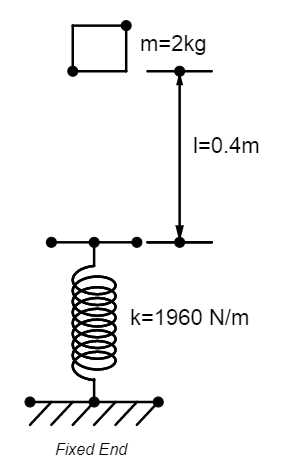Question
Question: A 2kg block is dropped from a height 0.4m on a spring of force constant k=1960 N/m. The maximum comp...
A 2kg block is dropped from a height 0.4m on a spring of force constant k=1960 N/m. The maximum compression of spring is
A. 0.1m
B. 0.2m
C. 0.3m
D. 0.4m
Solution
Hint: We apply the conservation of energy equation to obtain the maximum compression of the spring. Loss in gravitational potential energy is equal to the potential energy stored in the spring. You have to solve a quadratic equation to calculate the maximum compression.
Formulas used:
Ki+Pi+Wnc+OEi=Kf+Pf+OEf
mg(h+x)=21kx2
x=2a−b±b2−4ac
Complete step by step answer:
The conservation of energy is a classic concept of physics. It states that within a system the total amount of energy remains constant. Energy can neither be created nor be destroyed. The conservation of energy formula is:
Ki+Pi+Wnc+OEi=Kf+Pf+OEf………. (1)
where Kiis initial kinetic energy, Pi is initial potential energy, Wncis work done by non-conservative forces, OEi is other initial energies, Kfis final kinetic energy, Pfis final potential energy, OEf is other final energies.
The diagram below depicts our system:

We have, mass of the block = 2 kg; height (h) = 0.4m; force constant (k) = 1960N/m.
Let us consider x to be the maximum compression of the spring. So the total distance travelled by the block during free fall is(h+x).
By using the law of conservation of energy, we have loss in gravitational potential energy equal to the potential energy stored in the spring.
mg(h+x)=21kx2
Let us substitute the given values in the above equation
2×10(0.4+x)=21×1960×x2
⇒20x+8=980x2
⇒980x2+20x+8=0
So now we have to solve a quadratic equation with a=980, b=20, c=8
x=2a−b±b2−4ac
⇒x=2×980−20±202−4×980×8
⇒x=0.1m
So the correct option is (a).
Note: The loss in the gravitational potential energy might be confused to be negative but it is +mg(h+x) because during a free fall g is negative which makes the entire formula positive. Students should focus on giving directions to the forces which results in change in magnitude.
